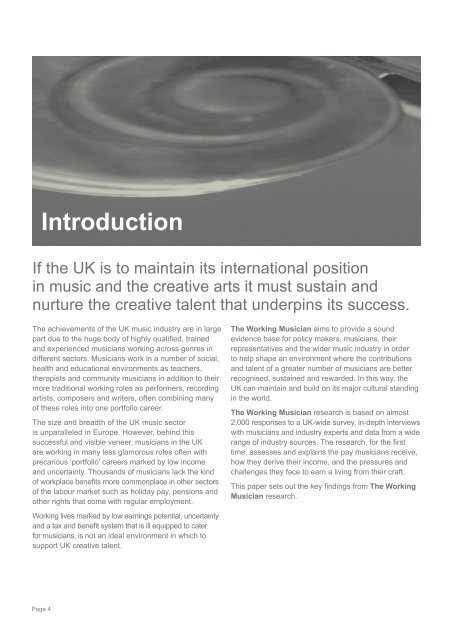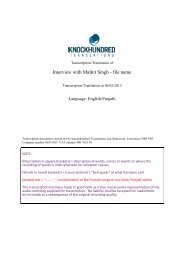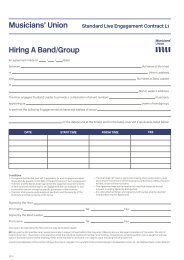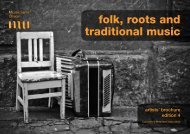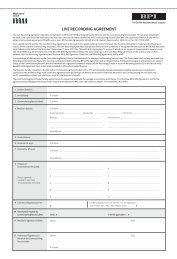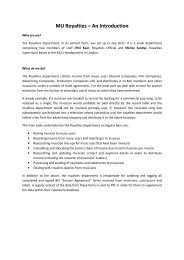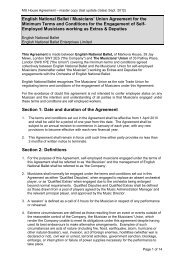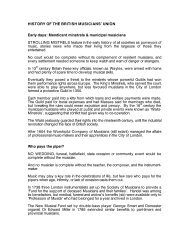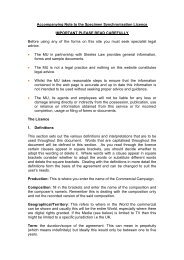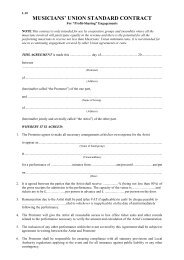The Working Musician report - Musicians' Union
The Working Musician report - Musicians' Union
The Working Musician report - Musicians' Union
You also want an ePaper? Increase the reach of your titles
YUMPU automatically turns print PDFs into web optimized ePapers that Google loves.
<strong>The</strong> <strong>Working</strong> <strong>Musician</strong>Key Findings<strong>Musician</strong>s encounter a tax andbenefit regime that is confusing,complex and is not well designedto cater for their unique workingpatterns. Designing a moreflexible and artist-friendly tax andbenefit regime would providemuch needed support forworking musicians.IntroductionIf the UK is to maintain its international positionin music and the creative arts it must sustain andnurture the creative talent that underpins its success.<strong>The</strong> achievements of the UK music industry are in largepart due to the huge body of highly qualified, trainedand experienced musicians working across genres indifferent sectors. <strong>Musician</strong>s work in a number of social,health and educational environments as teachers,therapists and community musicians in addition to theirmore traditional working roles as performers, recordingartists, composers and writers, often combining manyof these roles into one portfolio career.<strong>The</strong> size and breadth of the UK music sectoris unparalleled in Europe. However, behind thissuccessful and visible veneer, musicians in the UKare working in many less glamorous roles often withprecarious ‘portfolio’ careers marked by low incomeand uncertainty. Thousands of musicians lack the kindof workplace benefits more commonplace in other sectorsof the labour market such as holiday pay, pensions andother rights that come with regular employment.<strong>Working</strong> lives marked by low earnings potential, uncertaintyand a tax and benefit system that is ill equipped to caterfor musicians, is not an ideal environment in which tosupport UK creative talent.<strong>The</strong> <strong>Working</strong> <strong>Musician</strong> aims to provide a soundevidence base for policy makers, musicians, theirrepresentatives and the wider music industry in orderto help shape an environment where the contributionsand talent of a greater number of musicians are betterrecognised, sustained and rewarded. In this way, theUK can maintain and build on its major cultural standingin the world.<strong>The</strong> <strong>Working</strong> <strong>Musician</strong> research is based on almost2,000 responses to a UK-wide survey, in-depth interviewswith musicians and industry experts and data from a widerange of industry sources. <strong>The</strong> research, for the firsttime, assesses and explains the pay musicians receive,how they derive their income, and the pressures andchallenges they face to earn a living from their craft.This paper sets out the key findings from <strong>The</strong> <strong>Working</strong><strong>Musician</strong> research.<strong>Musician</strong>s are experienced,qualified and multi-skilled. Onlyone in five of those surveyed hadless than five years experience.Two thirds of musicians (65%)undertake four years or more offormal education and trainingwith 40% holding a degree inmusic.Pension provision is poorcompared to other professionals,employees, and even otherself-employed workers in thewider labour market. One infive employees (22%) and onein three self-employed workers(29%) in the wider labour markethave no independent pensionprovision; this rises to 65% formusicians.60%of musicians <strong>report</strong>working forfreein the past 12 months<strong>The</strong>re is no such thing as atypical musician. <strong>The</strong> blendof roles, patterns of paid andcreative work, employmentstatus and working hoursvary across musicians andacross different periods in theircareers. Developing a portfoliocareer, made up of a numberof different jobs, is a necessarycharacteristic of many musicians’careers; this invariably involvesdeveloping non-music skills suchas business, marketing, teachingand community engagement.Earnings for musicians arelow. Income levels compareunfavourably to otherprofessionals who’ve investedsimilar amounts of time andmoney into education andtraining. Over half (56%) of themusicians surveyed earn lessthan £20k and 60% of musicians<strong>report</strong> working for free in the past12 months.Over half(56%)of the musicianssurveyed earn lessthan£20kOf the musicians who receivethem, over half indicated thatroyalty payments are animportant additional incomestream; protecting and regulatingthis income source is incrediblyimportant to sustain musiciansin their careers, particularly giventhe wider context of low incomeand poor pension provision.Only 35%of musicians pay intoa pension schemePage 4Page 5


